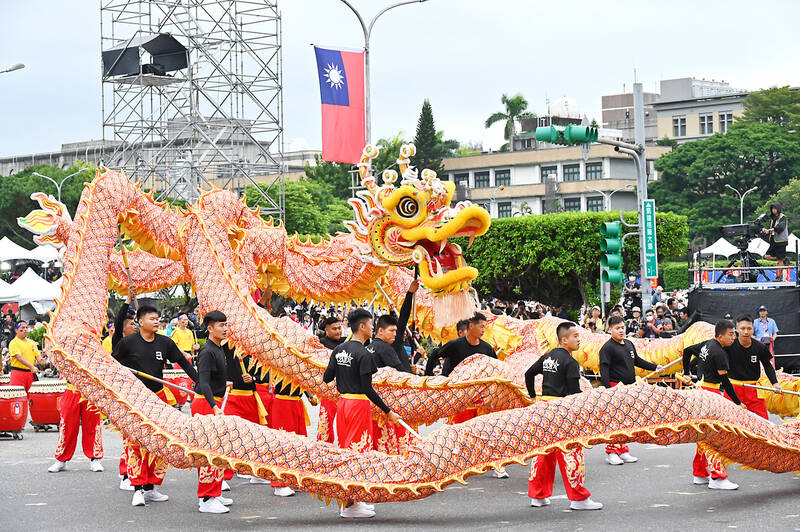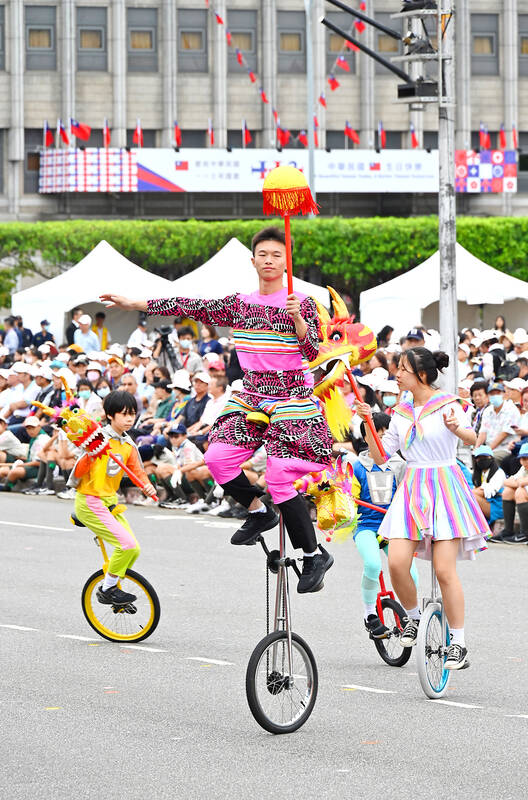President William Lai’s (賴清德) National Day speech was exactly what most of us expected. It was pleasant, full of keywords like “resilience” and “net zero” and lacked any trolling of the People’s Republic of China (PRC). Of course the word “Taiwan” popped up often, and Lai reiterated the longtime claim of his Democratic Progressive Party (DPP), a claim that now dates back 30 years on the pro-Taiwan side. But it was gentle. Indeed, it was possible to see the speech as conciliatory, leaving room for the PRC to make a gesture.
That may have been one of its purposes: if the PRC responds with its usual aggressive provocations, it will be visible to the world that no change in the vocabulary of the Taiwanese leadership, except “we submit,” will meet with a positive response from the PRC. A quietly strong speech exposes how the constant claim of the pro-PRC side, that there is a verbal formula that will produce a return to the status quo, is a pro-PRC lie intended to discredit the pro-Taiwan side.
The foreign press has been rather calm in its reporting of the speech. Both the US and the PRC issued boilerplate, the former calling on the PRC to behave itself, the latter blasting Lai as a “separatist.” Rush Doshi, who as Biden’s PRC man on the National Security Council from 2021 to this year, tweeted out that “Lai’s 10/10 speech was more restrained than his inaugural.”

Photo: Tu Chien-jung, Taipei Times
Doshi implied, like many other commentators, that the ball was in Beijing’s court.
“So the question now is whether Beijing wants to respond with escalation or its own restraint,” he said.
The well-known scholar Lev Nachman observed that while the focus would be on continuities between previous president Tsai Ing-wen (蔡英文) and Lai in their descriptions of Taiwan’s status, an important and often unnoticed continuity is “their emphasis on the need to address climate change and renewable energy.”

Photo: Tien Yu-hua, Taipei Times
This is critical, especially for a nation that puts out as much carbon dioxide as Taiwan does.
LAI AS CHEN SHUI-BIAN?
Like Tsai, Lai left the international media little it could use to insinuate that he was being provocative. While Tsai’s “measured” approach is generally discussed in the context of the PRC and the international security context, in fact she was trying to avoid being “ChenShuibianized” — treated as former DPP President Chen Shui-bian (陳水扁) was by the international media, and turned into a madwoman who could declare independence at any moment.

Photo: Tien Yu-hua, Taipei Times
Although this risk waned as Tsai handled it well and Taiwan’s position in the world has changed, it has returned for Lai. His domestic opponents are hell-bent on turning him into the Second Coming of Chen, and they have deep links to scholars and finance moguls in the US who want to sell out Taiwan to the PRC. Even as Lai spoke, former president Ma Ying-jeou (馬英九) of the Chinese Nationalist Party (KMT), who skipped the speech for the second straight year, was posting on Facebook that Lai was a “troublemaker.”
DOMESTIC VISION SAME OLD, SAME OLD
While the world parses Lai’s speech like Roman priests inspecting the guts of a sacrificial animal for “provocations” and suchlike, it’s important to note what was omitted when Lai switched to the domestic side.

Photo: Tien Yu-hua, Taipei Times
“We will redouble our efforts to combat fraud and fight housing speculation,” Lai said.
What efforts against housing speculation? All they had to do was change the tax system when they controlled the legislature. They have known this for years. This is why they are losing voters.
“We will expand care for renters and strike a balance with the needs of people looking to change homes,” he said.
The idea of expanded care for renters is a concession that the next generation will not own homes and the government will not make the changes necessary to address that issue. Lai offered no vision of walkable, livable cities. No mention of single family housing. As University of Wyoming academic Chen Yi-ling (陳怡伶) observes of urban planning in Taiwan “residents of Taiwanese communities are completely unable to direct the development of their own living environment.”
No urgently needed changes in the domestic political economy were even nodded at. Lai’s really important continuity with Tsai was not her positioning on Taiwan’s international status, but their shared failure to challenge the developmentalist ideology that is killing Taiwan. Instead, Lai signaled that the system will continue, unchanged, offering rent subsidies and minimum wage rises as sops to the voters, but leaving the bosses and developers in the saddle.
Does the DPP even want votes in the next election?
Lai laid out a program of technology development and growth, but there was not a word about the immigration policies necessary to support it. In fact, Taiwan’s low birth rates, declining population and complete lack of immigration policy were hardly addressed in the speech.
Lai did mention child-care subsidies, but only in the context of existing children, not as a stimulus to have more. Of course, such a speech must be positive, but it must also be serious. Taiwan’s catastrophic demographic trends are vital national security issues, more important than Lai’s presentation of Taiwan’s status.
Lai’s speech was a concrete demonstration of what scholars Catherine Chou and Mark Harrison argue in their new book on Taiwan, Revolutionary Taiwan: Making Nationhood in a Changing World Order, that “the threat from China siphons off Taiwanese resources and energy from quality-of-life issues and long-term socioeconomic planning,” Chou herself said last week.
DEVELOPMENTALIST STATE
The PRC threat has enabled successive presidents to freeze Taiwan’s domestic political economy while buying off voters with subsidies. This is in part because Taiwan’s economic successes, the foundation of Taiwan’s independent existence, legitimate the developmentalist state, especially when Taiwan is compared to the PRC. This gives developmentalist structures and policies added ideological oomph.
Lai’s speech pays tribute to that construction of Taiwan’s history, not merely in its recapitulation of the past, but in its vision of the future. Lai said that the government would “roll out the new Silicon Valley plan for Taoyuan, Hsinchu and Miaoli to form a central technology cluster connecting the north with the south” (this implies that later in his presidency Hsinchu and Miaoli will be combined into a new municipality, as many have predicted), and offering the “Smart Technology Southern Industrial Ecosystem Development Plan.” Lai hit all the keywords: “smart,” “cluster,” “ecosystem” and “Silicon Valley.”
A developmentalist dream for a nation that will be short hundreds of thousands of tech workers by the end of his first term, and has no immigration policy.
Notes from Central Taiwan is a column written by long-term resident Michael Turton, who provides incisive commentary informed by three decades of living in and writing about his adoptive country. The views expressed here are his own.

In the March 9 edition of the Taipei Times a piece by Ninon Godefroy ran with the headine “The quiet, gentle rhythm of Taiwan.” It started with the line “Taiwan is a small, humble place. There is no Eiffel Tower, no pyramids — no singular attraction that draws the world’s attention.” I laughed out loud at that. This was out of no disrespect for the author or the piece, which made some interesting analogies and good points about how both Din Tai Fung’s and Taiwan Semiconductor Manufacturing Co’s (TSMC, 台積電) meticulous attention to detail and quality are not quite up to

It is one of the more remarkable facts of Taiwan history that it was never occupied or claimed by any of the numerous kingdoms of southern China — Han or otherwise — that lay just across the water from it. None of their brilliant ministers ever discovered that Taiwan was a “core interest” of the state whose annexation was “inevitable.” As Paul Kua notes in an excellent monograph laying out how the Portuguese gave Taiwan the name “Formosa,” the first Europeans to express an interest in occupying Taiwan were the Spanish. Tonio Andrade in his seminal work, How Taiwan Became Chinese,

Mongolian influencer Anudari Daarya looks effortlessly glamorous and carefree in her social media posts — but the classically trained pianist’s road to acceptance as a transgender artist has been anything but easy. She is one of a growing number of Mongolian LGBTQ youth challenging stereotypes and fighting for acceptance through media representation in the socially conservative country. LGBTQ Mongolians often hide their identities from their employers and colleagues for fear of discrimination, with a survey by the non-profit LGBT Centre Mongolia showing that only 20 percent of people felt comfortable coming out at work. Daarya, 25, said she has faced discrimination since she

April 21 to April 27 Hsieh Er’s (謝娥) political fortunes were rising fast after she got out of jail and joined the Chinese Nationalist Party (KMT) in December 1945. Not only did she hold key positions in various committees, she was elected the only woman on the Taipei City Council and headed to Nanjing in 1946 as the sole Taiwanese female representative to the National Constituent Assembly. With the support of first lady Soong May-ling (宋美齡), she started the Taipei Women’s Association and Taiwan Provincial Women’s Association, where she